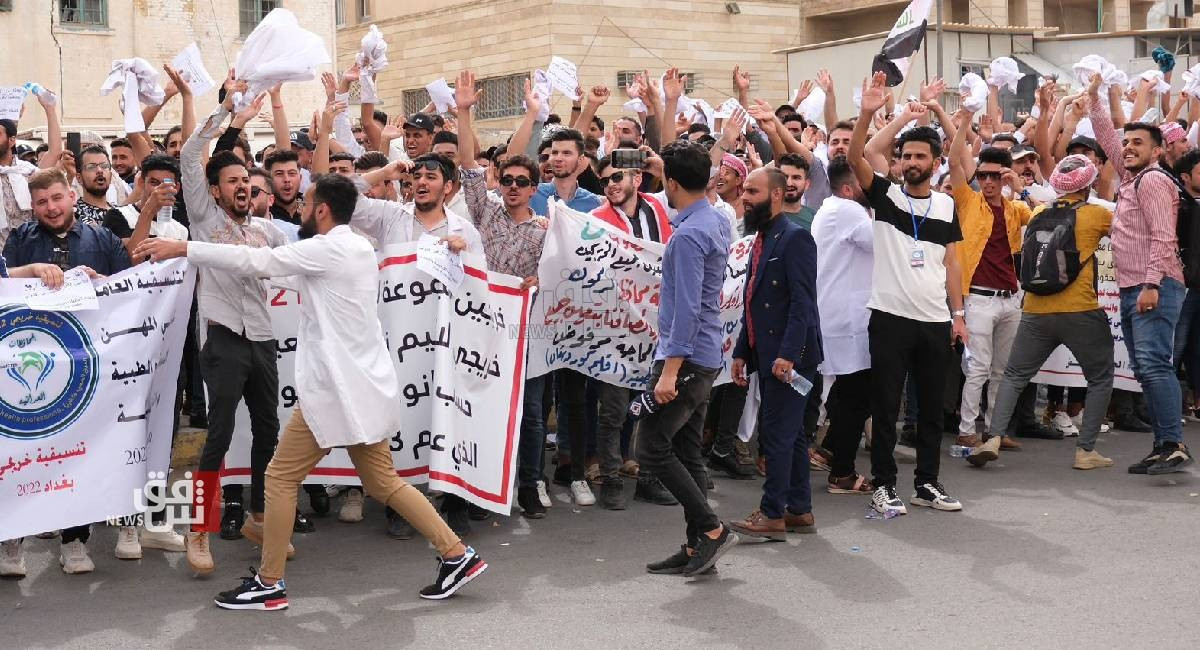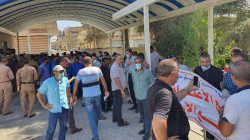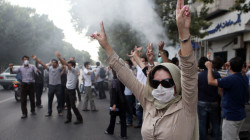Iraqi medical graduates continue protests over delayed employments

Shafaq News/ Over 27,000 medical and health graduates from the 2023 cohort are still awaiting the implementation of the Iraqi Cabinet’s decisions regarding their central appointments, per Law No. 6 of 2000.
The law mandates equal appointment opportunities for all medical professions, without differentiation between specialties. Graduates have pledged to continue their protests until their demands are met and justice is served for the medical sector.
Medical graduates from the 2023 class have been staging protests periodically to demand the implementation of the Medical Residency Law and to secure the necessary funding for their remaining appointments, as directed by Prime Minister Mohammed Shia Al-Sudani and the Iraqi Cabinet.
The most recent protest took place on Sunday, October 6, with hundreds of 2023 medical graduates demonstrating in front of the Ministry of Health in Baghdad due to the lack of appointments and the non-implementation of Section 6 of the 2000 law.
Earlier, in September, large demonstrations were held in Baghdad by healthcare professionals demanding job appointments. Clashes with security forces resulted in 25 protesters being injured.
Prime Minister Al-Sudani had previously ordered an investigation into the clashes during the healthcare professionals' protests and instructed the Baghdad Operations Command to be present at future protests to prevent further confrontations.
In September, Al-Sudani approved the appointment of around 60,000 medical and health graduates. However, many remain without appointments.
Alaa Al-Maliki, President of the Health Professions Syndicate, stressed that "the Iraqi government is obligated to appoint all medical graduates without exception, according to Law No. 6 of 2000, which clearly stipulates central appointments for all specialties."
Speaking to Shafaq News Agency, Al-Maliki added, "The law calls for universal appointments, not just for the 29,882 graduates currently appointed, leaving out 27,000 graduates, including pharmacists, dentists, lab technicians, anesthesiologists, forensic experts, and optometrists."
Al-Maliki pointed out that after medical protests, the Cabinet decided to appoint an entire batch using both existing and newly created job positions, reallocating roles from other ministries. However, he referred to these measures as "patchwork solutions," which is why protests continue, pressing the government to provide job placements for the remaining 27,000 graduates.
He emphasized that medical and health graduates must undergo a residency period in villages and rural areas—three years for doctors and two years for health professionals—before obtaining a license to practice privately. However, since they have not yet been appointed, they are unable to begin this process and, consequently, cannot open private clinics.
Al-Maliki also called for halting the expansion of medical and health programs in private colleges to address the over-saturation of graduates in the healthcare system.
Mohammed Al-Abadi, a representative of the 2023 medical graduates, explained that “the Cabinet issued decisions to appoint us, but they have not been implemented yet. We reject any delay in appointing part of the 2023 medical graduates.”
Al-Abadi reiterated that "medical and health graduates are determined to continue protesting until the Cabinet decisions are implemented and until justice is served for the medical sector."
Ali Mohammed, a 2023 anesthesia graduate, expressed frustration over the delays. "Medical appointments used to be immediate after graduation, but now there’s a delay," he said. "Studying medical and health specialties requires significant financial investment, along with the private tutoring before entering college and the countless sleepless nights during the study period."
He appealed to the Prime Minister to "expedite the release of appointments and resolve the current issue for thousands of medical graduates."
On September 10, the Iraqi Cabinet approved a phased approach to appointing medical and health graduates whose numbers exceed the quota set by the parliament in the General Budget Law.
According to a statement from the Cabinet, the phased appointment process will be based on the available resources, and the Ministry of Health will use the positions available through the current workforce movement.
If these positions are insufficient, the Ministry of Finance will identify and transfer job allocations from other government departments to the Ministry of Health.
In the event that the available positions still fall short, graduates not appointed this year will be deferred to the following year, with priority for appointments. Additionally, the Ministry of Health will implement a two-year medical residency program, after which graduates will be granted licenses to practice.





